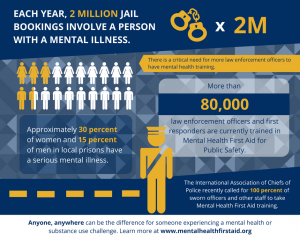 Across the Sacramento, California area, police officers are learning how to handle people who have mental illness. Law enforcement from twenty-two different departments recently took part in what is considered a “train the trainer” course in which they learned de-escalation techniques. They talked about how to look for certain behaviors and how to distinguish between developmental disabilities, mental health issues, and substance abuse.
Across the Sacramento, California area, police officers are learning how to handle people who have mental illness. Law enforcement from twenty-two different departments recently took part in what is considered a “train the trainer” course in which they learned de-escalation techniques. They talked about how to look for certain behaviors and how to distinguish between developmental disabilities, mental health issues, and substance abuse.
Ensuring Officers are Equipped to Handle Mental Illness
Training is another tool for police officers who now seem to be responding to more and more calls related to mental illness. You never know what is going to happen and mental illness can be scary and is hard for most of us to understand. Imagine how difficult it is for law enforcement officers. They don’t know if someone is genuinely suffering from mental illness and really needs help, or if they are acting or pretending with intentions to harm them or try to get away. Ensuring that officers are equipped to deal with the various things they come across on the street is so important.
Reality Check
In May this year, officers encountered a man who was threatening to jump off a highway overpass. Their training came into play and created a positive outcome in which they were able to stop the man from jumping. It could have turned out negatively if officers had not had this training and responded differently.
Sacramento Police Chief Daniel Hahn reported that his department has seen a steady uptake in calls to the 911 center related to people with mental illness. More than 6,000 calls already this year. On average there are 35 mental health calls per day.
Bravo to the Departments Providing Training
With these types of statistics, it is apparent that mental illness is a complex issue with no single solution. And it seems that one of the biggest challenges for law enforcement is what to do with people once they have been identified. The best outcome is to resolve the situation without anyone being injured—including themselves. But realistically, this can’t always happen. So, the more informed and educated our officers are about this issue, the better off the communities they serve will be as a whole.
